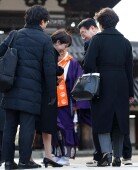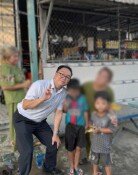SK Hynix’s cluster project should serve as a momentum for investment
SK Hynix’s cluster project should serve as a momentum for investment
Posted February. 23, 2019 07:52,
Updated February. 23, 2019 07:52
The 120-trillion-won project to create a semiconductor cluster has kicked off as Yongin, Gyeonggi Province was chosen as the location. SK Hynix, which is leading the project, said Thursday that it had submitted a letter of investment intent to the Yongin City. The chipmaker will invest 120 trillion won into the project to build four fabrication plants for some 50 material and parts subcontractors moving into on a site of 4.48 million square meters.
The plant, which is set to begin construction in 2022 and produce chips from 2024, catches the eyes of many as a large-scale investment is being made in a long time. It is important for the domestic chip industry to proactively make investment to maintain its No. 1 status in the world as semiconductor is the biggest export product for Korea and its worldwide demand is expected to soar with the rise of big data and artificial intelligence in the era of fourth industrial revolution. Other municipalities, including Icheon in Gyeonggi Province, Cheongju in North Chungcheong Province, Cheonan in South Chungcheong Province and Gumi in North Gyeongsang Province have completed fiercely to host the cluster along with Yongin. It is meaningful that Yongin, which is considered the best location to build fabs in Korea, has been picked, not being affected by any political considerations.
Once the cluster starts operation, a total of 17,000 jobs will be created by large corporations and their subcontractors. Advanced economies such as the U.S., Germany, and Japan recognized the importance of manufacturing that creates decent jobs and are striving to bring back overseas plants to home. Some 850 companies have returned to their home from 2010 to 2016 in the U.S. and carmakers and home appliance companies in Japan have been increasing domestic production since 2015. The Korean government has been supporting companies that are returning home since 2013 but only 54 have returned in six years as of this month.
The location has been decided but there are still many hurdles to overcome for the chip cluster to start construction in earnest. It needs to pass the deliberation of a deliberative body that regulates the total number of plants in the metropolitan area and several evaluations that assess its impact on environment, traffic, and cultural properties. Strong opposition by other municipalities that the decision goes against balanced regional development and civic groups that are against deregulation in the metropolitan area is another obstacle to overcome. The government and Yongin City should join efforts to offer “one-stop” administrative service so that the investment can be made without delay.






![[단독]정부, 석유화학 이어 배터리 구조조정 시사](https://dimg.donga.com/c/138/175/90/1/wps/NEWS/IMAGE/2026/01/15/133159957.1.jpg)
